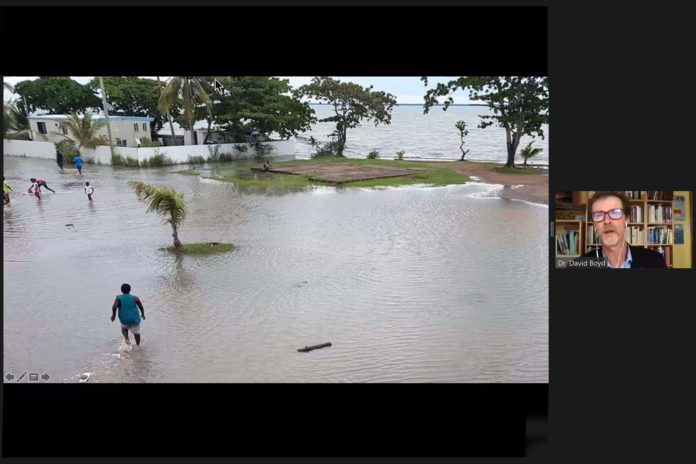

The Dr. Bernie Vigod Memorial Lecture in Human Rights featured speaker David Boyd, a United Nations special rapporteur on human rights and the environment. The lecture explored the topic of the transformative potential of the right to a healthy environment.
Boyd is also an associate professor of law, policy and sustainability at the University of British Columbia.
Throughout his career, he noted the importance of recognizing the right to a healthy environment, which includes clean air, safe and sufficient water, healthy and sustainably-produced food and non-toxic environments.
“The reality is that virtually all human rights depend on a healthy biosphere and a safe climate,” said Boyd. “We’ve created a climate emergency, a biodiversity crisis and pervasive pollution that causes 9 million premature deaths every year.”
Even though governments have signed treaties regarding climate change and halting the decline of biodiversity, including the 1992 Framework Convention on Climate Change and the Convention on Biological Diversity, Boyd said the lack of commitment and enforcement makes those efforts ineffective.
“Greenhouse gas emissions have risen more than 65 per cent since nations agreed to prevent dangerous anthropogenic interference with the Earth’s climate system in 1992,” he said.
Still, Boyd said the recent resolution by the UN Human Rights Council driven by Costa Rica, the Maldives, Morocco, Slovenia and Switzerland recognizes the right to a healthy environment. The resolution declared that a clean, healthy and sustainable environment is a human right.
“Countries that recognize this right in their constitutions have reduced air pollution more quickly, reduced greenhouse gas emissions more quickly and provided safe drinking water to a higher share of their citizens,” said Boyd.
Costa Rica, one of the countries that added this resolution to its constitution, has reversed a decade’s long process of deforestation, drastically improving the conditions of citizens.
“Costa Rica was the leading nation in the effort to have the United Nations recognized … so we all owe a debt of gratitude to Costa Rica,” said Boyd.
It has also increased the proportion of land in national parks by almost 30 per cent, passed laws prohibiting open-pit mining and oil and gas development, generated almost all of their electricity from renewable sources, and used carbon tax revenues to pay Indigenous Peoples and farmers to restore their land and to regenerate forests, said Boyd.
“The definition of human rights happens over time through governments, through courts, through usage … definitions are not fixed in time either,” said Boyd against that position.
One of the attendees, St. Thomas University student Julia Evans, reflected on the lecture. She included Boyd’s literature in a final paper for her rights revolution class. After reading and listening to Boyd’s lecture, she said action needs to be taken.
“When it comes to advocating for nature and for our right to a healthy environment, we as citizens must not compromise but demand for the greatest protections,” said Evans. “Without a healthy environment, all the other human rights we hold so dearly will become obsolete. Ultimately, there are no human rights without humanity.”
Shannonbrooke Murphy, STU’s endowed chair in human rights, was the lead organizer of the lecture. Murphy said these events are important because they promote human rights at STU and the University of New Brunswick.
“These are occasions when we confer on the invited speaker, the Atlantic Human Rights Centre Award for Excellence in Human Rights, which likewise gives us all … the opportunity to benefit from the ideas of current leading figures in the human rights field,” she said.
Murphy is thankful to Boyd and the students that participated in the lecture, especially during the question-and-answer period. She said anthropogenic climate change poses the biggest human rights challenge, so youth must have the necessary tools to confront it.
“It is my hope that students of this generation will be better armed to meet those challenges and lead the necessary changes,” said Murphy.
